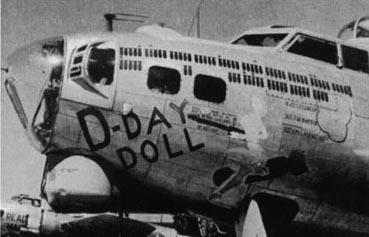UPL 23395
IMAGEBy downloading this image, you are agreeing to our Terms and Conditions
2nd Lt. Louis Sobolof Navigator on "Red Hot Mama" B-17 43-37821 Ditched in the North Sea , Captured and sent to Stalag deep into Germany. He survived and lived in NYC Changed his name to Sobol .Married Ruth Kraus and started what became the biggest Caviar import business in the U.S. called Caviarteria on Madison Ave. Manhattan, NYC. He passed away on February 20th 1992 He had two sons Bruce and Eric. who passed away tragically in the early 20O0's. He is survived by Ruth and his beautiful Granddaughter Lucy Sobol the daughter of Bruce and Lydia Sobol,
Connections
See how this entry relates to other items in the archive by exploring the connections below.
Units

- Unit Hierarchy: Squadron
- Air Force: Eighth Air Force
- Type Category: Bombardment
People

- Military/Civilian/Mascot: Military
- Nationality: American
- Unit: 447th Bomb Group 710th Bomb Squadron
- Service Numbers: 12122399 at enlistment, then O-723453
- Highest Rank: Second Lieutenant
- Role/Job: Navigator
Mission

- Date: 6 August 1944
Revisions
letter from Louis Sobolof in 1980's to Sgt. Bourque Recognition Programs Branch HQ AFMPC/DPMASA
Randolph Air Force Base ,Texas
http://www.nytimes.com/1992/02/22/obituaries/louis-sobol-72-dies-founde…
letter from Louis Sobolof in 1980's to Sgt. Bourque Recognition Programs Branch HQ AFMPC/DPMASA
Randolph Air Force Base ,Texas
...we were hit over the German mainland on our 3rd mission.I think the target was Berlin.We lost an engine over the target and I navigated the course outside of Germany as we constantly lost altitude and engines.We ditched the B17 in the North Sea near the Frisian Islands. A rescue plane dropped rubber motorized boats and was in turn shot down by two German planes in a dogfight right above our heads.A German flying boat landed alongside us and took us in.
After a couple of weeks in solitary during interrogation we were taken to our first Stalag. I do not recall the number but it was near Berlin and we arrived just shortly after a large break from the English compound, most whom had been recaptured. Incidentally , with regard to timing we are dealing now with Fall 1944 and you can establish the date more precisely if you wish to because the trains that brought us to the Stalag were loaded with soldiers who had been captured during the Battle of the Bulge.Around Xmas time the Russians were approaching from the east and we had to quite suddenly abandon camp.We set out upon a march to the South and I recall that it was freezing cold.
In fact I got frostbite and do not even remember walking the great distances,living off local handouts, and when we were lucky sleeping indoors in factories or gymnasiums.
Finally the train ride in cattle fashion brought us to our next Stalag outside of Nuremberg. This camp was completely disorganized, food was scarce and Red Cross packages did not arrive. Worst of all we were within a mile of the freight yards which were constantly bombed, and we well understood that the Germans were gong through.I think our stay here was no more than a couple of months and we took to the road again. This time it was obvious that the situation was disintegrating and the guards who accompanied us were more concerned with looking after their own skins than feeding us, or even observing the minimum civilities.
It was at this stage, as we marched south that one of my friends took ill and was dead by evening.We arrived beat and bedraggled at a Stalag near Munich that had obviously been in operation for many years because the intelligence and other operations were beautifully handled by the British, many of whom had been captive for four years.I might add that one of the most thrilling recollections of the entire period was the sight of theses British captives assembling in their compound on Sunday mornings with their kilts and bagpipes and dancing in such spirited fashion as if for the moment they were transported outside of their situation.Also the Russians who drifted through the various compounds and were maltreated by their captors; so much so, that upon the first day of liberation they went in to town and killed all the Germans they encountered. This liberation took place for us one morning in late spring 1945 when all our guards had disappeared during the night and General Patton rode triumphantly in the rear of a jeep to our stunned applause.
